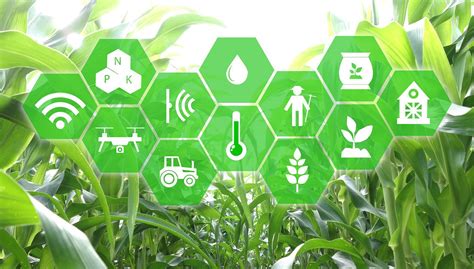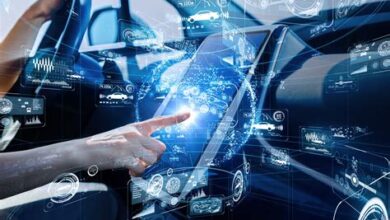How Technology is Transforming Agriculture

Learn about precision farming, automation, IoT, drones, and data-driven decision making in agriculture. Stay ahead with the latest advancements.In the past few decades, advancements in technology have revolutionized the way we live and work. One industry that has benefitted significantly from these advancements is agriculture. From precision farming to the use of drones, technology has transformed the way we grow and harvest crops. In this blog post, we will explore the various ways in which technology is shaping the future of agriculture.
Precision farming has allowed farmers to maximize yields while minimizing input costs by using GPS, soil scanning, and data management tools. Automation in agriculture, on the other hand, has reduced the need for manual labor and increased efficiency in tasks such as planting, irrigation, and harvesting. The Internet of Things (IoT) and smart farming have enabled farmers to monitor and manage their crops and livestock in real-time, leading to improved decision-making and increased productivity. Additionally, the use of drones in agriculture has allowed for aerial mapping, crop dusting, and livestock monitoring, while data-driven decision-making has revolutionized how farmers analyze and act on information to improve their operations. Join us as we delve into the exciting ways in which technology is reshaping the agricultural landscape.
Precision farming
Precision farming is a modern farming technique that uses technology to optimize agricultural production. This approach involves using smart technology such as GPS, GIS, remote sensing, and data analytics to make more informed decisions. Farmers can collect and analyze data on variables such as soil moisture, temperature, and nutrients to tailor their approach to each individual field or even specific areas within a field. By using precision farming techniques, farmers can increase crop yields, reduce waste, and minimize environmental impact.
One of the key benefits of precision farming is the ability to use resources more efficiently. By applying inputs such as fertilizers and pesticides more precisely, farmers can reduce costs and minimize the negative impact on the environment. This can also lead to improved soil health and reduce the risk of groundwater contamination. In addition, precision farming techniques can help farmers to better monitor and manage water usage, a critical concern in many agricultural regions.
Overall, precision farming represents a significant step forward for the agricultural industry. By leveraging the power of technology and data, farmers can take a more tailored and sustainable approach to their work. As technology continues to advance, we can expect even more innovative solutions to emerge, further transforming the way we produce food and manage our natural resources.
Automation in agriculture
Automation in agriculture has revolutionized the way farming is done. From planting to harvesting, technology has made it possible for many tasks to be automated, reducing the need for manual labor and increasing efficiency. Robotic farming equipment such as automated tractors and harvesters have taken over many labor-intensive tasks, allowing farmers to save time and resources.
Furthermore, precision agriculture technologies such as GPS-guided machinery and soil sensors have enabled farmers to optimize their operations. These technologies allow for the precise application of fertilizers and pesticides, reducing waste and environmental impact. Smart irrigation systems have also become essential in modern agriculture, with sensors and automated controls ensuring that crops receive just the right amount of water at the right time.
With the rise of IoT (Internet of Things) devices in agriculture, farmers can now remotely monitor and control various aspects of their operations. Connected sensors and devices provide real-time data on crop conditions, weather patterns, and equipment performance, allowing for timely and informed decision-making. This level of automation and connectivity has revolutionized the agricultural industry, making farming more efficient, sustainable, and productive.
IoT and smart farming
How Technology is Transforming Agriculture
IoT (Internet of Things) has revolutionized the way farming is done today, making it more efficient and productive than ever before. With the use of sensors, farmers are able to monitor and control every aspect of their farms in real-time, from soil moisture levels to crop growth to livestock health. This level of connectivity and data collection has paved the way for what is known as smart farming.
Through the use of IoT devices and smart technology, farmers can automate many of the essential tasks on their farms, such as irrigation, fertilization, and pest control. This not only saves time and labor, but also ensures that resources are used more efficiently, leading to higher yields and healthier crops.
Furthermore, the data collected from IoT devices can be analyzed to gain valuable insights into farming practices. This data-driven approach allows farmers to make more informed decisions, leading to better crop management, increased sustainability, and ultimately, greater profitability.
Use of drones in agriculture
With the advancement of technology, drones have become an essential tool in modern agriculture. Drones are being used for various purposes such as crop monitoring, field mapping, and spraying of fertilizers and pesticides. These unmanned aerial vehicles have the capability to cover large tracts of land in a short span of time, providing farmers with valuable insights about their crops and soil conditions.
One of the key benefits of using drones in agriculture is the ability to gather data that can help farmers make more informed decisions. By using drones equipped with high-resolution cameras and sensors, farmers can collect data on plant health, soil moisture levels, and crop yield. This data can then be analyzed to identify areas that require attention and optimize the use of resources.
In addition to data collection, drones are also being used for the precision application of inputs such as fertilizers and pesticides. By using drones to spray chemicals, farmers can reduce the amount of chemicals used, minimize wastage, and ensure that the chemicals are applied only where they are needed. This not only helps in reducing the environmental impact but also leads to cost savings for the farmers.
Data-driven decision making
With the advancement of technology, agriculture has also been witnessing a transformation in the way decisions are made. Data-driven decision making is becoming increasingly prevalent in the agricultural sector, as farmers are now relying on the analysis of large amounts of data to make informed choices about their operations.
This approach involves the collection of various types of data, such as weather patterns, soil conditions, crop performance, and market trends, and using advanced analytics tools to derive actionable insights from this information. By leveraging this data, farmers can make well-informed decisions about when to plant, water, fertilize, and harvest their crops, ultimately leading to improved yields and reduced resource wastage.
Moreover, the use of data-driven decision making allows farmers to optimize their resource allocation, minimize risks, and respond proactively to changing conditions, ultimately leading to more sustainable and efficient agricultural practices.





